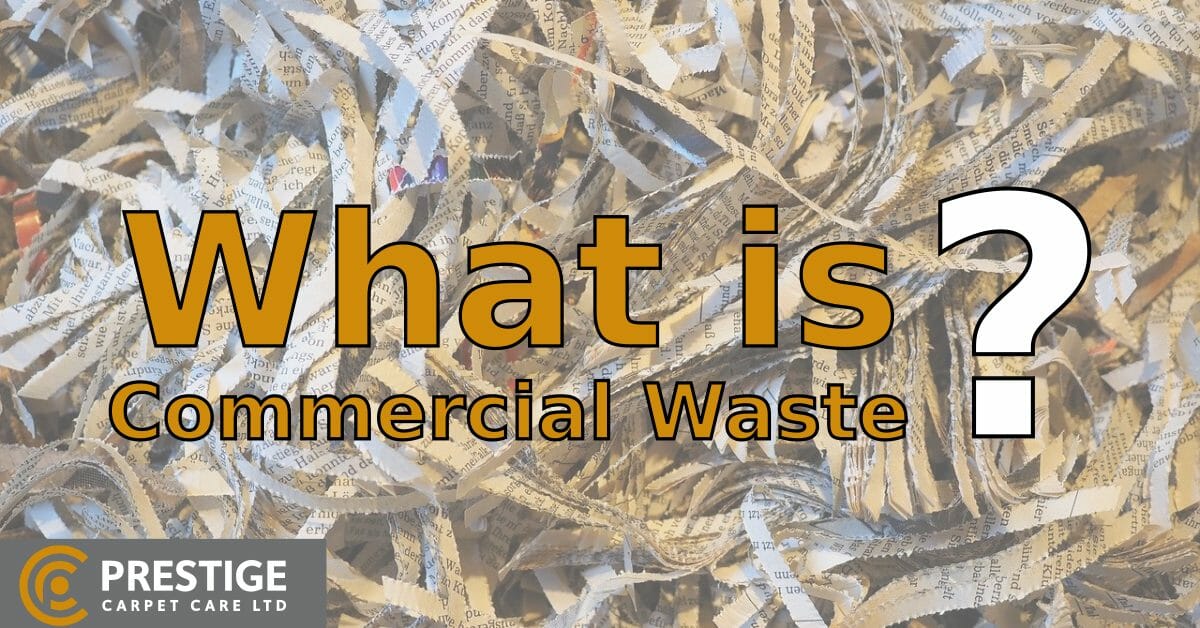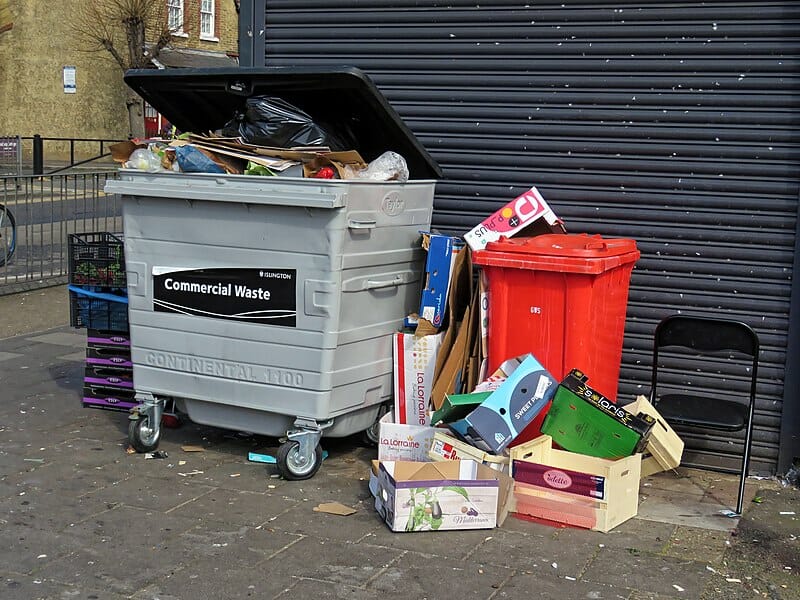
What is commercial waste?
As a broad rule of thumb, the term “commercial waste” is used to refer to waste that comes from commercial properties. These properties can be businesses or office spaces. Construction-related rubbish is also commercial waste. Waste from households, farms, and industries are also in this category.

What counts as commercial waste?
As a result of company activity, the business sector produces commercial waste. This type of waste is distinct from industrial waste. It is generated by businesses like wholesalers and catering companies, as well as stores and offices.
Subcategories include hazardous waste and commercial waste. But also demolition waste, and others dependent on the specific business operations.
Commercial waste, or “business waste,” is normally the duty of each firm to dispose of. It is the responsibility of each company to arrange for the collection of their waste. Generally speaking, municipal waste includes waste from smaller stores and commercial estates. Local authorities have established waste collection arrangements for this type of waste.
Commercial waste examples
Timber, concrete, and brick are typical commercial waste products. Also, tile, rubble and metal are among the materials that make up the bulk of commercial waste. All stages of construction, site clean-ups, and home cleaning are common sources of this material. This type of waste is not hazardous.
Legally disposing of your commercial waste
What are the penalties for non-compliance?
- Depositing litter – up to £2,500
- Street litter control notice – up to £2,500
- Clearing notice – up to £2,500
- Failure to produce waste documents – up to £5,000
- Failure to produce authority to transport waste – up to £5,000
- Waste receptacle notice – up to £1,000
- Fly-tipping – up to 12 months imprisonment
- Failure to comply with your duty relating to the transfer of household waste – unlimited fine
Can I dispose of commercial waste myself?
Your own waste can be disposed of if you can present “waste transfer notes,” or a receipt that shows the following:
- Where you disposed of the waste
- How much waste you had to dispose off
- When you disposed of the waste
- Description of the waste you disposed off
Alternatively, you might hire someone else to collect and dispose of your waste. Your selected contractor must be a licensed waste hauler, and you must fill out a “duty of care” paperwork with him or her.
Penalty charges for illegally disposing of commercial waste
You will be prosecuted if you are caught unlawfully disposing of your waste. Magistrates’ courts can impose penalties up to £50,000 and 12 months in jail. Also, the crown court can issue fines up to an infinite amount.
You may face up to five years in prison and a fine of up to £50,000 if someone discovers your waste is fly tipped. Also, if you cannot establish that you have not discarded it and that you have met with all the essential regulations. A £300 fine can be issued if waste transfer notes are not produced.
Many think that once commercial waste is thrown out, it is no longer the obligation of the firm to dispose of it.
Until it is picked up by a licensed waste carrier, everyone who generates waste has a legal obligation to take care of it.
What commercial office waste recycling options are available?
- Waste Paper and Cardboard – Reduce your environmental impact and save avoidable waste by recycling paper. Each ton of recycled paper could save around 17 trees. It also saves around 2 cubic yards of landfill and 4100kW,/hours of power.
- Plastic – About 50 distinct types of plastic exist, each with a variety of subtypes. In order to limit the quantity of waste that ends up in landfills and avoid pollution of the seas, it is imperative that plastic is recycled.
- Metal – It is possible to recycle all grades of non-ferrous and ferrous metal. We can recycle metal many times over, since it doesn’t lose its quality when recycled. To get a sense of how much energy recycling may save, one aluminium beverage can run a television for around three hours.
- Electronic devices – Electronic products recycling focuses on keeping electrical things out of landfills. Computers, phones, and televisions are all included in this category since they are powered by a battery or a socket.
- Wood – Wood is the ideal renewable resource due to its wide range of applications. As a construction material, wood may be reused or recycled into mulch. Low-quality wood is valuable because it can create renewable energy.
- Glass – Because glass is recyclable, we may reuse it without losing purity or quality. Glass can take up to one million years to dissolve completely. This makes it a major problem for overflowing landfills.
- Textile – About 50% of all the fabrics and textiles we throw away are recyclable.
- Bricks – Cleaning and reusing the recycled bricks in another project can save money. Also, it can significantly reduce waste. Crushing them into brick chips and using them in landscaping as a soil improver and ground cover is much better.
Why commercial waste is different from household waste
There are a few reasons why commercial waste gets a different treatment than household waste:
- Larger waste production by commercial enterprises.
- Certain wastes such as “Regulated Waste” must be properly dealt with.
- Commercial waste has a separate statutory framework. This results in additional compliance obligations for Council.
How to make sure you have minimum waste in your office
Recycling as much as possible effectively reduces commercial waste. Recycling is more environmentally friendly than dumping your waste in a landfill.
Having containers for recyclables like plastic, paper, and cardboard at your business is one way to keep waste to a minimum. By doing so, you will be able to segregate all your business recycling material.
If you have a waste management company, consult them on getting a few separate rubbish bins/cans. This way you can select the waste you throw out and make it easier to recycle.
What is commercial cleaning?
This article covers what commercial waste is, if you are interested in finding out what commercial cleaning actually means and what you can expect from a commercial cleaning company then please visit our page “what is commercial cleaning”


